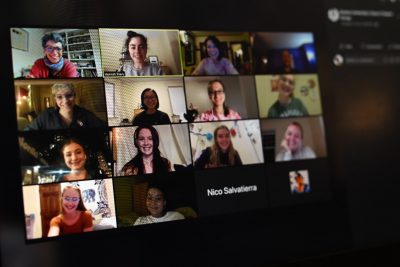
This Fall, the Boston University Dance Department has cut its number of in-person classes by more than half.
No more than nine out of the 31 dance-oriented classes offered to students are currently in person — with mask-wearing and social distancing requirements — to prevent the spread of the coronavirus, Micki Taylor-Pinney, director of dance at BU, wrote in an email.
The department chose course formats based on instructors’ workplace adjustment requests, room occupancy limits and whether each class was more suited for in-person or remote learning.
In compliance with state and City health recommendations, instructors of dance classes have had to adjust to 14-foot grids taped to the floors to keep students distanced, Taylor-Pinney wrote. She added that dance content is now designed around mask-wearing and classes are smaller than previous years.
Taylor-Pinney wrote that despite the lack of in-person contact, the department aims to do everything it can to keep students interested.
“From problem-solving about how to have class without physical contact to sharing best practices on ‘Zoom dancing’ to moving our special programs and residences to a remote platform,” Taylor-Pinney wrote, “we needed to find ways to keep people engaged and involved.”
The biggest concern students had expressed about Learn from Anywhere, Taylor-Pinney wrote, was that dance courses — PDPs — were either only in-person or remote, and there was no mesh of the two.
She wrote the department regularly emailed dance minors about new developments and held two town halls in August to address their concerns.
Students, however, Taylor-Pinney wrote, still yearn to dance in the studios.
“People long to be back in the studio, dancing, and rehearsing,” Taylor-Pinney wrote. “We’ve adjusted to provide students with options that fit their situation and our pandemic world.”
Dance minor Nanaka Kawada, a senior in the College of Arts and Sciences, said she feels the BU dance program has been communicating well with students on COVID-19 adjustments.
Kawada said taking remote classes means missing out on the resources the University can typically provide.
“It’s hard to take some classes over Zoom,” Kawada said. “I’m taking my ballet class over Zoom, but I don’t have a bar and I don’t have the dance floor.”
Kawada, a member of BU’s Dance Theatre Group –– an organization for students interested in performance and choreography –– said she also faces some challenges as a choreographer.
“I have to admit that it’s hard to choreograph and teach people movement over Zoom,” Kawada said. “But I think I am able to try new stuff and new skills, so I think that’s quite valuable.”
Claire-Solene Becka, DTG president and CAS senior, wrote in an email the group has created a hybrid system that makes it possible for both on- and off-campus members to participate. This includes holding weekly master classes over Zoom, while giving on-campus members the option to attend in-person rehearsals.
While group enrollment is down by 20 percent, Becka wrote, the program is “still thriving” this semester. The group has planned bonding events and hopes to safely make connections over activities such as in-person PDPs and outdoor rehearsals.
To keep with its semesterly tradition, DTG also plans to have a modified concert this Fall: “Origins Online 2020.” The concert will comprise recorded videos of student choreography along with movement chains of dancers, Becka wrote. It will premiere Nov. 20 on YouTtube.
CAS senior Fiona Jackson said taking and teaching Zoom dance classes can be a challenge when it comes to adjusting to space restrictions.
“It’s definitely weird to try and make room in my single in my apartment to do anything,” Jackson said. “It involves quite a bit of modification.”
Jackson said having an instructor who understands that students don’t necessarily have the space to do all dance movements helps alleviate the stress of the modified process. She added that trying to adjust a laptop so the camera captures her full body while dancing is one of the bigger challenges of attending remote dance classes.
Dancing is more of a tactical tool, Jackson said, and the adjustments made this semester provide learning points.
“I just do it for more mental health and just enjoyment,” Jackson said. “It’s helpful, in a way, to challenge myself with trying to do things more on my own and in a very modified space as opposed to a studio.”
These modifications are here to stay, Kris Covarrubias, assistant director of marketing and communications for BU’s Fitness and Recreation Center wrote in an email, adding that FitRec plans to offer similarly structured classes next semester, with in-person and remote options.
























































































































